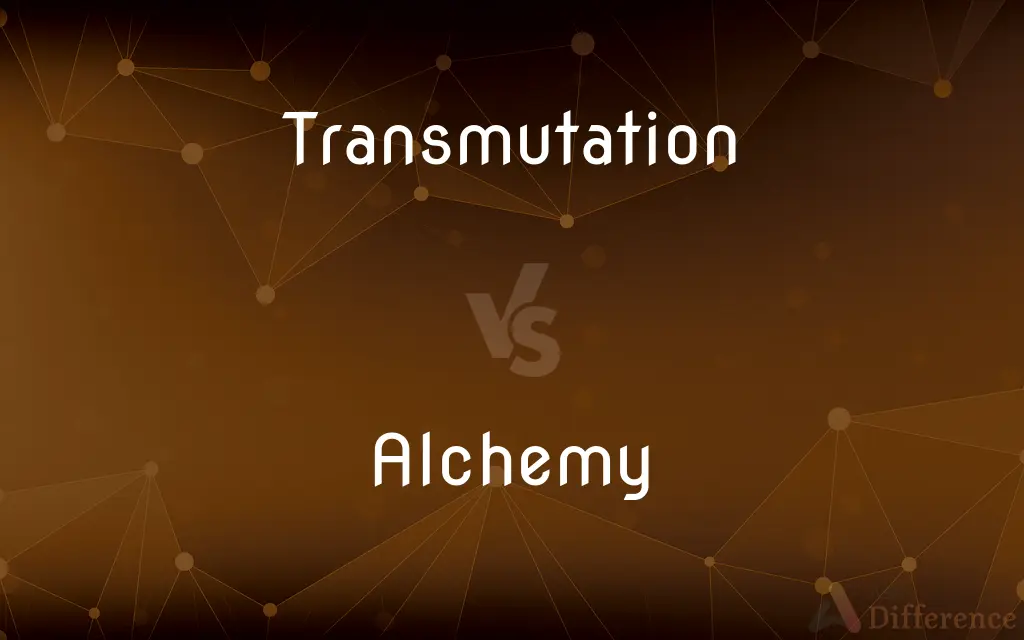Transmutation vs. Alchemy — What's the Difference?
By Tayyaba Rehman & Fiza Rafique — Updated on March 20, 2024
Transmutation involves changing one substance into another, while alchemy combines philosophy, spirituality, and proto-science, aiming for transmutation and more.

Difference Between Transmutation and Alchemy
Table of Contents
ADVERTISEMENT
Key Differences
Transmutation primarily refers to the change of one substance into another, especially at the atomic or molecular levels, as seen in nuclear physics and chemistry. Alchemy, on the other hand, is a broader discipline that historically combined elements of chemistry, philosophy, astrology, and spirituality, focusing on the transmutation of matter, particularly turning base metals into gold, and the quest for the philosopher's stone.
Transmutation is now most commonly associated with nuclear reactions, where elements are changed into different elements, such as turning lead into gold or uranium into plutonium. Alchemy, while it sought similar changes, was as much a spiritual and philosophical pursuit as it was a practical one, with alchemists believing their work reflected deeper truths about the universe and human existence.
In modern science, transmutation is a well-understood and observable phenomenon with practical applications, such as in nuclear reactors and medical isotope production. Alchemy, despite its lack of scientific basis, played a crucial role in the development of early scientific methods and the eventual emergence of chemistry as a distinct field.
The goal of transmutation is often practical, aiming for the creation of valuable elements or isotopes for use in various industries. Conversely, alchemy’s goals were broader, seeking not just material wealth but also spiritual purification and enlightenment, with the transmutation of metals serving as a metaphor for personal transformation.
Transmutation processes are guided by strict physical laws and principles, understood through the lens of modern physics and chemistry. Alchemy, while it involved meticulous experimentation, was guided as much by symbolic and mystical principles as by empirical observation, reflecting a blend of material and spiritual quests.
ADVERTISEMENT
Comparison Chart
Definition
The change of one element or substance into another through a process.
An ancient practice combining elements of chemistry, philosophy, and spirituality.
Primary Focus
Atomic or molecular changes, especially in nuclear reactions.
Transmutation of matter, discovery of the philosopher's stone, and spiritual enlightenment.
Historical Context
Modern concept, primarily in physics and chemistry.
Predates modern science, with roots in the Middle Ages and ancient practices.
Practical Applications
Nuclear reactors, isotope production for medicine.
Led to the development of experimental science and modern chemistry.
Philosophical Aspects
Limited, focused on physical and chemical laws.
Integral, with a blend of mysticism, spirituality, and experimental methodology.
Compare with Definitions
Transmutation
A controlled process in scientific experiments.
Scientists achieved transmutation by bombarding elements with high-speed particles.
Alchemy
A medieval practice aimed at the transmutation of matter, often into gold, and searching for life-extending elixirs.
Alchemy combined early scientific experiments with mystical pursuits.
Transmutation
Initially sought through alchemy but achieved through modern science.
Alchemists' dreams of transmutation paved the way for nuclear chemistry.
Alchemy
The mythical substance capable of turning base metals into gold.
The quest for the philosopher's stone symbolized ultimate knowledge and immortality.
Transmutation
Applied in creating elements and isotopes not found naturally.
Transmutation processes produce medically important isotopes for treatments.
Alchemy
Contributed to the development of modern chemistry.
Alchemy's experimental methods laid groundwork for systematic chemical research.
Transmutation
The act or process of changing one element into another, as in nuclear physics.
Transmutation in nuclear reactors involves changing uranium into plutonium.
Alchemy
Influenced literature, psychology, and the arts.
Alchemy's rich symbolism and quest for transformation appear in various works of art.
Transmutation
A physical change where atomic nuclei are transformed.
Nuclear transmutation occurs when uranium-238 absorbs a neutron and becomes plutonium-239.
Alchemy
A journey for personal and spiritual purification.
Alchemists viewed their work as a spiritual path towards enlightenment.
Transmutation
The action of changing or the state of being changed into another form
Grotesque transmutations
The transmutation of the political economy of the post-war years was complete
Alchemy
Alchemy (from Arabic: al-kīmiyā; from Ancient Greek: khumeía) is an ancient branch of natural philosophy, a philosophical and protoscientific tradition that was historically practiced in China, India, the Muslim world, and Europe. In its Western form, alchemy is first attested in a number of pseudepigraphical texts written in Greco-Roman Egypt during the first few centuries CE.Alchemists attempted to purify, mature, and perfect certain materials.
Transmutation
The act or an instance of transmuting; transformation.
Alchemy
The medieval forerunner of chemistry, concerned with the transmutation of matter, in particular with attempts to convert base metals into gold or find a universal elixir
Occult sciences, such as alchemy and astrology
Transmutation
The state of being transmuted.
Alchemy
A medieval chemical philosophy having as its asserted aims the transmutation of base metals into gold, the discovery of the panacea, and the preparation of the elixir of longevity.
Transmutation
(Physics) Transformation of one element into another by one or a series of nuclear reactions.
Alchemy
A seemingly magical power or process of transmuting
"He wondered by what alchemy it was changed, so that what sickened him one hour, maddened him with hunger the next" (Marjorie K. Rawlings).
Transmutation
The supposed conversion of base metals into gold or silver in alchemy.
Alchemy
(uncountable) The premodern and early modern study of physical changes, particularly in Europe, Arabia, and China and chiefly in pursuit of an elixir of immortality, a universal panacea, and/or a philosopher's stone able to transmute base metals into gold, eventually developing into chemistry.
The purpose of physical alchemy—as opposed to its various spiritual pursuits—was to treat the supposed leprosity of base metals such as lead, refining and purifying them into gold.
Transmutation
(obsolete) Change, alteration.
Alchemy
(countable) The causing of any sort of mysterious sudden transmutation.
Transmutation
The conversion of one thing into something else; transformation.
Alchemy
Any elaborate transformation process or algorithm.
Transmutation
(alchemy) Specifically, the supposed transformation of one element into another, especially of a base metal into gold.
Alchemy
An imaginary art which aimed to transmute the baser metals into gold, to find the panacea, or universal remedy for diseases, etc. It led the way to modern chemistry.
Transmutation
(physics) The actual transformation of one element into another by a nuclear reaction.
Alchemy
A mixed metal composed mainly of brass, formerly used for various utensils; hence, a trumpet.
Put to their mouths the sounding alchemy.
Transmutation
The act of transmuting, or the state of being transmuted; as, the transmutation of metals.
Alchemy
Miraculous power of transmuting something common into something precious.
Kissing with golden face the meadows green,Gilding pale streams with heavenly alchemy.
Transmutation
The change or reduction of one figure or body into another of the same area or solidity, but of a different form, as of a triangle into a square.
Alchemy
A pseudoscientific forerunner of chemistry in medieval times
Transmutation
The change of one species into another, which is assumed to take place in any development theory of life; transformism.
Alchemy
The way two individuals relate to each other;
Their chemistry was wrong from the beginning -- they hated each other
A mysterious alchemy brought them together
Transmutation
An act that changes the form or character or substance of something
Transmutation
A qualitative change
Transmutation
(physics) the change of one chemical element into another (as by nuclear decay or radioactive bombardment);
The transmutation of base metals into gold proved to be impossible
Common Curiosities
Can transmutation occur naturally?
Yes, natural transmutation occurs in processes like radioactive decay.
Did alchemy contribute to any scientific fields?
Yes, alchemy played a key role in the development of modern chemistry and scientific methods.
What is the significance of the philosopher's stone in alchemy?
It symbolized ultimate wisdom and the ability to achieve perfection, both materially and spiritually.
Were alchemists successful in their goals?
While alchemists did not achieve their goal of transmuting base metals into gold, their work laid the foundation for modern chemistry.
Is the philosopher's stone real?
The philosopher's stone is a mythical concept from alchemy with no basis in reality.
How is transmutation used today?
It's used in nuclear reactors and in producing isotopes for medical and industrial applications.
How do nuclear reactions relate to transmutation?
Nuclear reactions are a form of transmutation, as they involve changing one element into another.
Was gold ever created through alchemy?
Despite numerous attempts, alchemists were never able to create gold through alchemical processes.
What is the main difference between transmutation and alchemy?
Transmutation is a specific process of changing one element into another, while alchemy is an ancient practice that sought transmutation among other goals.
What role did alchemy play in the history of science?
Alchemy contributed to the development of experimental methods and the empirical approach that characterizes modern science.
Can alchemy be considered a science?
Alchemy is often viewed as a precursor to modern science, blending experimental processes with mysticism.
What led to the decline of alchemy?
The rise of empirical science and the scientific method made many of alchemy’s goals and methods obsolete.
Can transmutation be reversed?
In theory, transmutation could be reversed in certain reactions, but this is generally not practical or energy-efficient.
Are there modern equivalents to alchemy?
Modern chemistry and physics can be seen as the successors to alchemy, especially in their pursuit of material transformation.
Did alchemy have any spiritual or philosophical goals?
Yes, beyond the material goals, alchemy aimed at spiritual purification and enlightenment.
Share Your Discovery

Previous Comparison
Washcloth vs. Towel
Next Comparison
Toffy vs. ToffeeAuthor Spotlight
Written by
Tayyaba RehmanTayyaba Rehman is a distinguished writer, currently serving as a primary contributor to askdifference.com. As a researcher in semantics and etymology, Tayyaba's passion for the complexity of languages and their distinctions has found a perfect home on the platform. Tayyaba delves into the intricacies of language, distinguishing between commonly confused words and phrases, thereby providing clarity for readers worldwide.
Co-written by
Fiza RafiqueFiza Rafique is a skilled content writer at AskDifference.com, where she meticulously refines and enhances written pieces. Drawing from her vast editorial expertise, Fiza ensures clarity, accuracy, and precision in every article. Passionate about language, she continually seeks to elevate the quality of content for readers worldwide.
















































